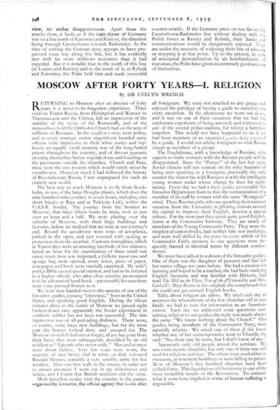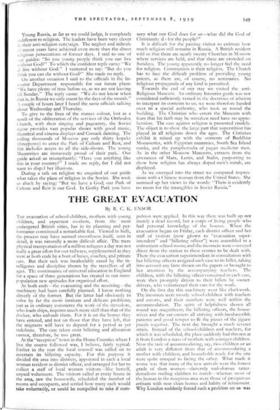MOSCOW AFTER FORTY YEARS-I. RELIGION
By SIR EVELYN WRENCH RETURN1NG to Moscow after an absence of forty years is a never-to-be-forgotten experience. Three visits to Tsarist Russia, from Helsingfors and Warsaw to Transcaucasia and the Crimea, left an impression of the stability of the regime of the Romanoffs, and of the tremendous hold thc Orthodox Church had on the tens of millions of Russians. In the smallest towns were police, and in every strategic centre magnificent bearded army officers were impressive in their white tunics and topboots; an equally vivid memory was of the long-haired priests throughout the country, and of devout peasants crossing themselves before wayside ikons and kneeling on the pavements outside the churches. Church and State, these were the two powers which would surely never be overthrown. However much I had followed the history of Revolutionary Russia, I was unprepared for such an entirely new world.
The best way to reach Moscow is to fly from Stockholm, in one of the large Douglas planes, which does the nine hundred miles journey in seven hours, including two short breaks at Riga and at Velekoje I.uki, within the U.S.S.R. border. The journey from the .frontier to Moscow, that takes fifteen hours by train, took us just over an hour and a half. We were planing over the suburbs of Moscow, with their large buildings and factories, before we realised that we were at our journey's end. Round the aerodrome were rows of aeroplanes, parked in the open, and just covered with sacking as protection from the weather. Customs formalities, which in Tsarist days were an amusing interlude of five minutes, lasted an hour for the examination of three small suit cases; every item was inspected, a Gillette razor-case and sponge bag were opened, every letter, piece of paper, newspaper and book were carefully examined. My wife's pocket Bible caused special interest, and had to be referred to a higher official, who after close scrutiny pronounced it to be a botanical hand-book—presumably because there were some pressed flowers in it.
We were now handed over to the mercies of one of the Intourist guides, a young "citizeness," born in the United States, and speaking good English. During the fifteen minutes drive to the centre of Moscow we passed eight broken-down cars; apparently the Soviet experiment in synthetic rubber has not been too successful. The first impression was of all-pervading drabness. There -were, of course, some large new buildings, but for the most part the houses looked dirty and uncared for. The Moscow crowds I shall never forget; all joy has gone from their faces; they were subsequently described by an old resident as "A people who never smile." Men and women went about hatless. Very few coats were worn, the majority of men being clad in white or dark coloured Russian blouses, certainly a very sensible attire for hot weather. After our first walk in the streets, in order not to attract attention I went out in my shirtsleeves and ticless, and I found that British residents did the same.
Most travellers to-day visit the country in the parties organised by lntourist, the official agency that looks after all foreigners. We were not attached to any group and enjoyed the privilege of having a guide to ourselves for every excursion. In the afternoons we went out alone, and it was on one of these occasions that we had the unpleasant experience of being arrested, and conveyed to one of the central police-stations, for taking a harmless snapshot. This would not have happened to us if we had been members of an organised party, duly escortei by a guide. I would not advise foreigners to visit Russia except as members of a group.
The Englishman, with a knowledge of Russian, who expects to make contacts with the Russian people will be disappointed. Since the "Purges" of the last few years Soviet citizens will not venture on the risky business of being seen speaking to a foreigner; practically the only contact the visitor has with Russians is with the intelligent young women under whose charge he does his sightseeing. Every day we had a fresh guide; presumably the Intourist Department fears to risk the contamination of a member of its staff by contact with the same "Bourgeois" mind. These Russian girls, who are spending their summer vacation from the University in piloting visitors around the capital to improve their English, deserve a special tribute. For the most part they speak quite good English, learnt at the Communist Institute. They are nearly all members of the Young Communist Party. They wore the simplest of cotton frocks, had neither hats nor stockings, and were well drilled by the party in every article of the Communist Faith; answers to our questions were frequently framed in identical terms by different conductresses.
We must have talked to a dozen of the Intourist guides. One of them was the daughter of peasants and had left her native village ten years before. She had a passion for learning and hoped to be a teacher; she had been studying English literature and was familiar with Dickens, had read The Mill on the Floss, Tess of the d'Urbervilles and Mrs. Gaskell's Mary Barton in the original; she complained that she could not get enough English books. Talks about religion are taboo. We tried each day to ascertain the whereabouts of the few churches still in use; finally we had to turn for information to an American visitor. Each day we addressed some questions concerning religion to our guides; the reply was nearly always the same: "We know nothing about the Church." Our guides, being members of the Communist Party, were naturally atheists. We asked one of them if she knew whether any of her contemporaries went tolthurch; she said: "No, there may be some, but I don't know of any." Apparently only old people attend the services. We saw some twenty churches, but only one of them was still used for religious services. The others were used either as museums, as tenement buildings or were falling to pieces. M )st of Moscow's five hundred churches have been pulled down. This liquidation of Christianity is one of the most incredible results of the Revolution. To estimate what it must have implied in terms of human suffering is impossible. Young Russia, as far as we could judge, is completely indifferent to religion. The leaders have been very clever in their anti-religion cam?aign. The neglect and ridicule of recent years have achieved even more than the direct religious persecutions of former days. I said to one of our guides: "So you young people think you can live without God?" To which the confident reply came: "We do live without God." I ventured to say: "But do you think you can die without God?" She made no reply.
On another occasion I said to the officials in the Intourist Department responsible for our future plans: "We have plenty of time before us, as we are not leaving till Sunday." The reply came: "We do not know when that is, in Russia we only count by the days of the month." :1 couple of hours later I heard the same officials talking about Wednesday and Thursday.
To give to the lives of the masses colour, lost as a result of the obliteration of the services of the Orthodox Church, with their singing and pageantry, the Soviet regime provides vast popular shows with good music, theatrical and cinema displays and Cossack dancing. The toiling thousands of Moscow pay only thirty kopeks (threepence) to enter the Park of Culture and Rest, and this includes access to all the side-shows. The young Muscovites are immensely proud of their park. Our guide asked us triumphantly: "Have you anything like this in your country?" I made no reply, for I did not want to dispel her illusions.
During a talk on religion we enquired of our guide what takes the place of religion in the Soviet. She took us aback by saying: "But we have a God; our Park of Culture and Rest is our God. In Gorky Park you have seen what our God does for us—what did the God of Christianity d ) for the people?"
It is difficult for the passing visitor to estimate how much religion still remains in Russia. A British resident told us that there are nearly twenty Churches in Moscow where services are held, and that these are crowded on Sundays. The young apparently no longer feel the need for religion. Communism is their religion. The Church has to face the difficult problem of providing young priests, as there are, of course, no seminaries. No religious propaganda of any kind is permitted. Towards the end of our stay we visited the antiReligious Museum. An ordinary Intourist guide was hot considered sufficiently versed in the doctrines of atheism to interpret its contents to us; we were therefore handed over to a special authority, who took us round the building. The Christian who enters the Museum with fears that his faith may be mistaken need have no apprehension. The case against religion is presented crudely. The object is to show the large part that superstition has played in all religions down the ages. The Christian exhibit is mixed up with the contents of Buddhist Monasteries, with Egyptian mummies, South Sea Island masks, and the paraphernalia of pagan medicine men. As in the other Moscow Museums, extracts from the utterances of Marx, Lenin, and Stalin, purporting to show how religion has always doped men's minds, are displayed.
As we emerged into the street we compared impressions with a Chinese woman from the United States. She summed up her views in the words: "There is evidently no room for the intangibles in Soviet Russia."























 Previous page
Previous page